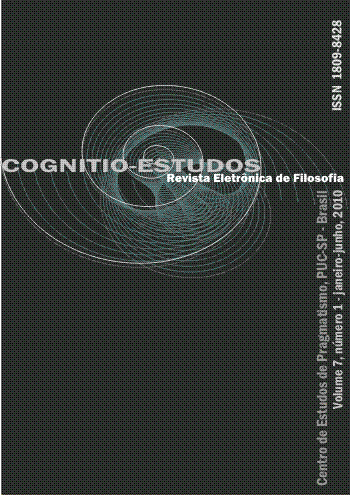VALUES AND LOGICAL TOLERANCE: JOHN DEWEY AND RUDOLF CARNAP
Palavras-chave:
Logical Positivism. Pragmatism. Philosophy of Formal Sciences. Theory of Valuation.Resumo
This paper discusses the relation of Rudolf Carnap and the Pragmatism of John Dewey, exploring two points of apparent disagreement between their philosophies. The first one is the claim that Carnap’s logic is committed to the traditional duality between form and content, which Dewey rejects. The second one is the supposition that Carnap would reject Dewey’s treatment of values as a sort of pseudoproblem. Following Carnap’s comments on his Principle of Tolerance and the consequences such principle has in his philosophy of science, this paper shows that there is no fundamental disagreement between the two authors, but only a difference of approach. Carnap doesn’t have the objective of reconstructing philosophy, as Dewey does; he aims at developing tools for the advancement of semantics, which is a specific field of inquiry in Dewey’s sense. On the other hand, it is possible to understand Dewey’s theory of valuation as a legitimate empirical science in the Carnapian sense.Métricas
Carregando Métricas ...
Referências
AYER, Alfred Jules. (1936). Language, Truth and Logic. London: Penguin Books.
CARNAP, Rudolf. [1934] (2002). The Logical Syntax of Language. Translated by Ameathe Smeathon (Countess von Zeppelin). Chicago and La Salle: Open Court.
________________. [1936-7] [1950] (1996). “Testability and Meaning”. 2nd Edition. IN: Sarkar, 1996, pp. 200-65.
CARNAP, Rudolf. [1953] (1956). “Empiricism, Semantics and Ontology”. 2n Edition. IN: Carnap, 1956, Meaning and Necessity. 2nd Edition. Chicago: University of Chicago Press, pp. 205-21.
________________. (1962). Logical Foundations of Probability. 2nd Edition. Chicago: University of Chicago Press.
________________. (1963). “Kaplan on Value Judgements”. IN: Schilpp, 1963, pp. 999-1013.
CUNHA, Ivan Ferreira da. (2009). “Charles Morris e o Pragmatismo de Rudolf Carnap”. Cognitio-Estudos. São Paulo: PUC, v. 6, n. 1, pp. 15-20, jan./jun. 2009.
DEWEY, John. [1920] (2004). Reconstruction in Philosophy. Mineola, New York: Dover Publications.
___________. [1925] (1958). Experience and Nature. Mineola, New York: Dover Publications.
___________. [1929] (2008). The Quest for Certainty. Carbondale: Southern Illinois University Press.
___________. [1938] (2008). Logic: The Theory of Inquiry. Carbondale: Southern Illinois University Press.
___________. [1939] (1970). Theory of Valuation. IN: Neurath et al, 1970, pp. 379- 447.
FRIEDMAN, Michael. (1999). Reconsidering Logical Positivism. Cambridge: Cambridge University Press.
FRIEDMAN, Michael; CREATH, Richard. (org.). (2007). The Cambridge Companion to Carnap. Cambridge: Cambridge University Press.
MORRIS, Charles W. [1938b] (1955). Foundations of the Theory of Signs. IN: Neurath et al, 1955, pp. 77-137.
NEURATH, Otto; CARNAP, Rudolf; MORRIS, Charles W. (org.). (1955). International Encyclopedia of Unified Science. Volume 1. Chicago: Chicago University Press.
____________________________________________________. (1970). International Encyclopedia of Unified Science. Volume 2. Chicago: University of Chicago Press.
POPPER, Karl. (1963). “The Demarcation Between Science and Metaphysics”. IN: Schilpp, 1963, pp. 183-226.
REISCH, George A. (2005). How the Cold War Transformed Philosophy of Science –To the Icy Slopes of Logic. Cambridge: Cambridge University Press.
RICHARDSON, Alan W. (2007). “Carnapian Pragmatism”. IN: Friedman; Creath, 2007, pp. 295-315.
SARKAR, Sahotra. (org.). (1996). Logical Empiricism at its Peak. New York e London: Garland.
SCHILPP, Paul Arthur. (org.). (1963). The Philosophy of Rudolf Carnap. La Salle: Open Court.
CARNAP, Rudolf. [1934] (2002). The Logical Syntax of Language. Translated by Ameathe Smeathon (Countess von Zeppelin). Chicago and La Salle: Open Court.
________________. [1936-7] [1950] (1996). “Testability and Meaning”. 2nd Edition. IN: Sarkar, 1996, pp. 200-65.
CARNAP, Rudolf. [1953] (1956). “Empiricism, Semantics and Ontology”. 2n Edition. IN: Carnap, 1956, Meaning and Necessity. 2nd Edition. Chicago: University of Chicago Press, pp. 205-21.
________________. (1962). Logical Foundations of Probability. 2nd Edition. Chicago: University of Chicago Press.
________________. (1963). “Kaplan on Value Judgements”. IN: Schilpp, 1963, pp. 999-1013.
CUNHA, Ivan Ferreira da. (2009). “Charles Morris e o Pragmatismo de Rudolf Carnap”. Cognitio-Estudos. São Paulo: PUC, v. 6, n. 1, pp. 15-20, jan./jun. 2009.
DEWEY, John. [1920] (2004). Reconstruction in Philosophy. Mineola, New York: Dover Publications.
___________. [1925] (1958). Experience and Nature. Mineola, New York: Dover Publications.
___________. [1929] (2008). The Quest for Certainty. Carbondale: Southern Illinois University Press.
___________. [1938] (2008). Logic: The Theory of Inquiry. Carbondale: Southern Illinois University Press.
___________. [1939] (1970). Theory of Valuation. IN: Neurath et al, 1970, pp. 379- 447.
FRIEDMAN, Michael. (1999). Reconsidering Logical Positivism. Cambridge: Cambridge University Press.
FRIEDMAN, Michael; CREATH, Richard. (org.). (2007). The Cambridge Companion to Carnap. Cambridge: Cambridge University Press.
MORRIS, Charles W. [1938b] (1955). Foundations of the Theory of Signs. IN: Neurath et al, 1955, pp. 77-137.
NEURATH, Otto; CARNAP, Rudolf; MORRIS, Charles W. (org.). (1955). International Encyclopedia of Unified Science. Volume 1. Chicago: Chicago University Press.
____________________________________________________. (1970). International Encyclopedia of Unified Science. Volume 2. Chicago: University of Chicago Press.
POPPER, Karl. (1963). “The Demarcation Between Science and Metaphysics”. IN: Schilpp, 1963, pp. 183-226.
REISCH, George A. (2005). How the Cold War Transformed Philosophy of Science –To the Icy Slopes of Logic. Cambridge: Cambridge University Press.
RICHARDSON, Alan W. (2007). “Carnapian Pragmatism”. IN: Friedman; Creath, 2007, pp. 295-315.
SARKAR, Sahotra. (org.). (1996). Logical Empiricism at its Peak. New York e London: Garland.
SCHILPP, Paul Arthur. (org.). (1963). The Philosophy of Rudolf Carnap. La Salle: Open Court.
Downloads
Publicado
2010-05-12
Como Citar
da Cunha, I. F. (2010). VALUES AND LOGICAL TOLERANCE: JOHN DEWEY AND RUDOLF CARNAP. Cognitio-Estudos: Revista eletrônica De Filosofia, 7(1), 9–18. Recuperado de https://revistas.pucsp.br/index.php/cognitio/article/view/2893
Edição
Seção
Artigos

